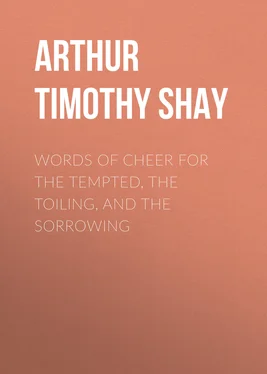Timothy Arthur - Words of Cheer for the Tempted, the Toiling, and the Sorrowing
Здесь есть возможность читать онлайн «Timothy Arthur - Words of Cheer for the Tempted, the Toiling, and the Sorrowing» — ознакомительный отрывок электронной книги совершенно бесплатно, а после прочтения отрывка купить полную версию. В некоторых случаях можно слушать аудио, скачать через торрент в формате fb2 и присутствует краткое содержание. Жанр: foreign_sf, literature_19, foreign_antique, foreign_prose, на английском языке. Описание произведения, (предисловие) а так же отзывы посетителей доступны на портале библиотеки ЛибКат.
- Название:Words of Cheer for the Tempted, the Toiling, and the Sorrowing
- Автор:
- Жанр:
- Год:неизвестен
- ISBN:нет данных
- Рейтинг книги:3 / 5. Голосов: 1
-
Избранное:Добавить в избранное
- Отзывы:
-
Ваша оценка:
- 60
- 1
- 2
- 3
- 4
- 5
Words of Cheer for the Tempted, the Toiling, and the Sorrowing: краткое содержание, описание и аннотация
Предлагаем к чтению аннотацию, описание, краткое содержание или предисловие (зависит от того, что написал сам автор книги «Words of Cheer for the Tempted, the Toiling, and the Sorrowing»). Если вы не нашли необходимую информацию о книге — напишите в комментариях, мы постараемся отыскать её.
Words of Cheer for the Tempted, the Toiling, and the Sorrowing — читать онлайн ознакомительный отрывок
Ниже представлен текст книги, разбитый по страницам. Система сохранения места последней прочитанной страницы, позволяет с удобством читать онлайн бесплатно книгу «Words of Cheer for the Tempted, the Toiling, and the Sorrowing», без необходимости каждый раз заново искать на чём Вы остановились. Поставьте закладку, и сможете в любой момент перейти на страницу, на которой закончили чтение.
Интервал:
Закладка:
His first care was to take the father of the family aside, and gather from him the story of his misfortunes. It was a long and mournful tale, and Mr. Cleveland was obliged, more than once, to pretend a sudden call out of the room, that he might hide his emotion. And the tale was by no means told in vain. True to his new resolutions, Mr. Cleveland thankfully accepted the work which Providence had given him to do, and the family of emigrants, to this day, mention the name of Cleveland with tears of gratitude and love, and, when they implore God's mercy for themselves, never forget to invoke, for their kind benefactor, Heaven's choicest blessings. Nor is that the only family whose hearts glow at the mention of Mr. Cleveland's name. Far and wide his name is known, and honoured, and beloved.
And Mr. Cleveland has found out the real secret of happiness. It is true that he and Tom still have their squabbles, for Tom is really a provoking fellow, and Mr. Cleveland is, and always will be, an eccentric, impulsive man, but his heart, which, when we first introduced him to our readers, was far from being right with God, or with his fellow-men, is now the dwelling-place of love and kindness, and the experience of every day contributes to strengthen the new principles he has imbibed, and to confirm him in the right.
Reader! art thou sad or solitary? I can offer thee a certain cure for all thy woes. Contemplate the life of Him who spake as never man spake. Follow him through all those years of toil and suffering. See him wherever called by the sorrows of his human brethren, and witness his deeds of mercy and his offices of love, and then—"go thou and do likewise."
REBECCA
HER words were few, without pretence
To tricks of courtly eloquence,
But full of pure and simple thought,
And with a guileless feeling fraught,
And said in accents which conferred
Poetic charm on household word.
She needed not to speak, to be
The best loved of the company—
She did her hands together press
With such a child-like gracefulness;
And such a sweet tranquillity
Upon her silent lips did lie,
And such unsullied purity
In the blue heaven of her eye.
She moved among us like to one
Who had not lived on earth alone;
But felt a dim, mysterious sense
Of a more stately residence,
And seemed to have a consciousness
Of an anterior happiness—
To hear, at times, the echoes sent
From some unearthly instrument
With half-remembered voices blent—
And yet to hold the friendships dear,
And prize the blessings of our sphere—
In sweet perplexity to know
Which of the two was dreamy show,
The dark green earth, the deep blue skies,
The love which shone in mortal eyes,
Or those faint recollections, telling
Of a more bright and tranquil dwelling.
We could not weep upon the day
When her pure spirit passed away;
We thought we read the mystery
Which in her life there seemed to be—
That she was not our own, but lent
To us little while, and sent
An angel child, what others preach
Of heavenly purity, to teach,
In ways more eloquent than speech—
And chiefly by that raptured eye
Which seemed to look beyond the sky,
And that abstraction, listening
To hear the choir of seraphs sing.
We thought that death did seem to her
Of long-lost joy the harbinger—
Like an old household servant, come
To take the willing scholar home;
The school-house, it was very dear,
But then the holidays were near;
And why should she be lingering here?
Softly the servant bore the child
Who at her parting turned and smiled,
And looked back to us, till the night
For ever hid her from our sight.
LIFE A TREADMILL
WHO says that life is a treadmill?
You, merchant, when, after a weary day of measuring cotton-cloth or numbering flower barrels, bowing to customers or taking account of stock, you stumble homeward, thinking to yourself that the moon is a tolerable substitute for gas light, to prevent people from running against the posts—and then, by chance, recall the time when, a school-boy, you read about "chaste Dian" in your Latin books, and discovered a striking resemblance to moonbeams in certain blue eyes that beamed upon you from the opposite side of the school-room.
Ah! those were the days when brick side-walks were as elastic as India rubber beneath your feet; shop windows were an exhibition of transparencies to amuse children and young people, and the world in prospect was one long pleasure excursion. Then you drank the bright effervescence in your glass of soda-water, and now you must swallow the cold, flat settlings, or not get your money's worth. Long ago you found out that the moon is the origin of moonshine, that blue eyes are not quite as fascinating under gray hair and behind spectacles, and that "money answereth all things."
You say so, clerk or bank-teller, when you look up from your books at the new-fallen snow glistening in the morning light, and feel something like the prancing of horses' hoofs in the soles of your boots, and hear the jingling of sleigh bells in your mind's ear, long after the sound of them has passed from your veritable auriculars.
You say so, teacher, while going through the daily drill of your A B C regiments, your multiplication table platoons, and your chirographical battalions.
You say so, factory girl, passing backward and forward from the noise and whirl of wheels in the mills, to the whirl and noise of wheels in your dreams.
You say so, milliner's apprentice, as you sit down to sew gay ribbons on gay bonnets, and stand up to try gay bonnets on gay heads.
You say so, housemaid or housekeeper, when the song of the early bird reminds you of crying children, whose faces are to be washed; when the rustling of fallen leaves in the wind makes you wonder how the new broom is going to sweep; when the aroma of roses suggests the inquiry whether the box of burnt coffee is empty; and when the rising sun, encircled by vapoury clouds, brings up the similitude of a huge fire-proof platter, and the smoke of hot potatoes.
There is a principle in human nature which rebels against repetitions. Who likes to fall asleep, thinking that to-morrow morning he must get up and do exactly the same things that he did to-day, the next day ditto, and so forth, until the chapter of earthly existence is finished!
It is very irksome for these soaring thoughts winged to "wander through eternity," to come down and work out the terms of a tedious apprenticeship to the senses. And yet, what were thoughts unlocalized and unembodied? Mere comets or vague nebulosities in the firmament, without a form, and without a home.
All things have their orbit, and are held in it by the power of two great opposing forces.
Outward circumstances form the centripetal force, which keeps us in ours. Let the eccentric will fly off at ever so wide a tangent for a time, back it must come to a regular diurnal path, or wander away into the "blackness of darkness." And if these daily duties and cares come to us robed in the shining livery of Law, should we not accept them as bearers of a sublime mission?
"What?" you say, "anything sublime in yardstick tactics or ledger columns? Anything sublime in washing dishes or trimming bonnets? The idea is simply ridiculous!"
No, not ridiculous; only a simple idea, and great in its simplicity. For the manner of performing even menial duties, gives you the gauge and dimensions of the doer's inward strength. The power of the soul asserts itself, not so much in shaping favourable circumstances to desired ends, as in resisting the pressure of crushing circumstances, and triumphing over them.
Читать дальшеИнтервал:
Закладка:
Похожие книги на «Words of Cheer for the Tempted, the Toiling, and the Sorrowing»
Представляем Вашему вниманию похожие книги на «Words of Cheer for the Tempted, the Toiling, and the Sorrowing» списком для выбора. Мы отобрали схожую по названию и смыслу литературу в надежде предоставить читателям больше вариантов отыскать новые, интересные, ещё непрочитанные произведения.
Обсуждение, отзывы о книге «Words of Cheer for the Tempted, the Toiling, and the Sorrowing» и просто собственные мнения читателей. Оставьте ваши комментарии, напишите, что Вы думаете о произведении, его смысле или главных героях. Укажите что конкретно понравилось, а что нет, и почему Вы так считаете.












